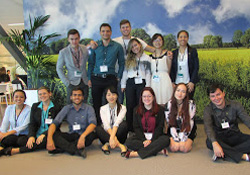The learning goes both ways
Lessons learned from the first group to complete the Cargill Global Scholars program help set the course for future participants
October 12, 2015
A three-year, multi-national, skill-building experience known as the Cargill Global Scholars program is wrapping up for the inaugural class. Now their feedback is helping shape the syllabus for future scholars.
 Lessons learned from the first group to complete the Cargill Global Scholars program help set the course for future participants.
“We realize we were kind of the guinea pigs for the program,” said Emma Likens, a 2013 Cargill Global scholar and recent graduate of the University of Nebraska, Lincoln. “But one of the strengths of the program is that it was very flexible. You typically think of academic programs as being sort of slow to change, but this was different.”
Lessons learned from the first group to complete the Cargill Global Scholars program help set the course for future participants.
“We realize we were kind of the guinea pigs for the program,” said Emma Likens, a 2013 Cargill Global scholar and recent graduate of the University of Nebraska, Lincoln. “But one of the strengths of the program is that it was very flexible. You typically think of academic programs as being sort of slow to change, but this was different.”
Likens and her peers embarked on the program in 2013, its inaugural year. She was one of 56 second-year university students selected from each the BRIC countries (Brazil, Russia, India and China) and the United States. Cargill committed approximately $6 million to fund the five-year program, designed to reach approximately 200 future leaders.
Global education experts from the International Institute of Education (IIE) worked with a Cargill team led by Tolá Oyewole, Director of the Cargill Foundation and Corporate Giving, to find the scholars. They selected high-achieving students with leadership potential who were seeking degrees in agriculture, risk management and other fields relevant to Cargill.
Program coordinators have been impressed with the participants. “They are very smart. Intuitive. Experienced. And playing big parts in organizations -- at their schools and in their communities,” said U.S. Global Scholars HR Lead Jack Bandy.
For Likens and many other participants, the $2,500 annual award – one element of the program – helped her with tuition. The aspect of the program that really set it apart for her, however, was the opportunity to connect with Cargill in person. More than 100 Cargill employees volunteered to serve as mentors to the scholars.
The scholars also attended a three-day seminar in their home countries in the first year, and met for a weeklong Global Seminar in the U.S. in year two. During the seminars, they met with Cargill leaders, learned about the company’s leadership philosophy and experienced personal brand-building activities such as Myers Briggs. Scholars also developed case studies on real-life business issues, and presented their findings to their peers and Cargill leaders.
“I got more out of the experiences than I did from the help toward tuition,” said Likens, who is now working in Cargill Animal Nutrition in Kansas City. “The financial part was just an added perk.”
Wenshi Zhang, a Chemical Engineering and Management student at the University of Minnesota who went on to an internship at Exxon Mobil, had similar feedback.
“I really liked having the ability to interact with people from different countries,” Zhang said. “In the workforce there are people from different cultural backgrounds, so getting exposed to that at an early stage is very beneficial.”
The scholars’ enthusiasm for the international elements of the program led to changes for the next Global Seminar. In 2015, the Global Seminar was held in Amsterdam, allowing every participant to have a global experience.
IIE is continually surveying the scholars, and their input continues to drive change. For instance, scholars noted that the third-year commitments to the program were difficult to schedule in their final year of school, during internships or their first year on-the-job. The Cargill and IIE teams have redesigned a two-year program that will expand its reach to Indonesia.
“Even though the goal of the program is to develop high-performers in important Cargill markets and build a network of global leaders who won’t necessarily work for Cargill, we’re finding that students wanted to learn more about Cargill,” said Oyewole. “We’re building a talent pipeline and developing leaders who may eventually work for us, or our partners.”
